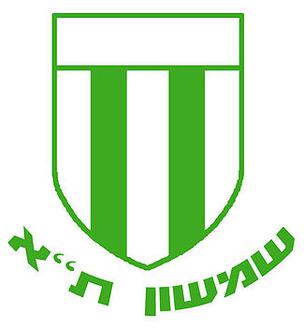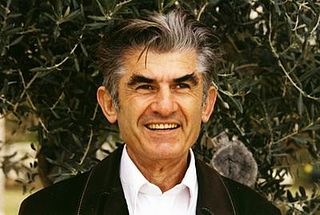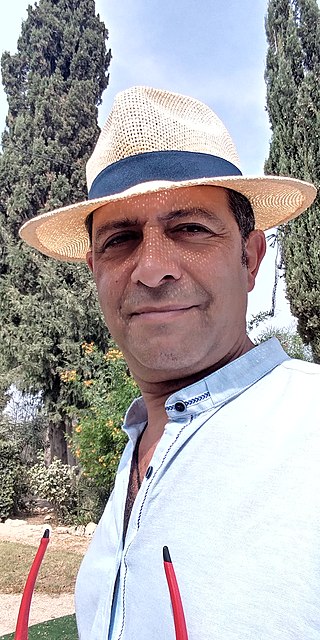A major contributor to this article appears to have a close connection with its subject.(July 2017) |
Gidi Avivi | |
|---|---|
| Born | 1961 (age 62–63) |
| Occupation | film producer |
Gidi Avivi (born 1961) is an Israeli film producer, the founder of Vice Versa Films. [1]
A major contributor to this article appears to have a close connection with its subject.(July 2017) |
Gidi Avivi | |
|---|---|
| Born | 1961 (age 62–63) |
| Occupation | film producer |
Gidi Avivi (born 1961) is an Israeli film producer, the founder of Vice Versa Films. [1]
Avivi holds a Master's degree in Cinema Studies from New York University and a Bachelor of Fine Arts degree in Film and Television from Tel Aviv University. Avivi was the Head of the Music Department and a music programmer at the IDF radio station. Concurrently, Avivi was the popular music critic for the weekly magazine Ha'ir from 1983 to 1987 and the daily newspaper Haaretz from 1994 to 2006. [2] [3]
Between 1994 and 1998 Avivi created (with Yoav Kutner, Ami Amir, Arik Bernstein and Gabriel Bibliowicz) a comprehensive 12-part documentary series about the history of Israeli rock music, “Sof Onat Hatapuzim” ("End of the Orange Season"). [4] In 2006 Avivi produced two documentary films: Bekummernis (with Ido Sela) and The Cahana Sisters (with Amir Harel and Gilad Melzer). [5] [6] In 2008 Avivi produced (with Yael Biron and Dror Nahum) a documentary about Ehud Banai and The Refugees - On The Move. [7] In 2011 Avivi founded Vice Versa Films, a production house for feature films, short films and TV series.
Since 2016 Avivi is the Artistic Consultant of Solidarity International Human Rights Film Festival, Tel Aviv. [8] The fourth edition of Solidarity Festival took place in April 2016 at the Tel Aviv Cinematheque.
The fifth edition of the festival took place in May 2017. The opening night film was "The Unknown Girl" directed by the Dardenne Brothers . The lineup included documentaries, including "Speed Sisters" and narrative films including "Junction 48".
In 2009, Avivi, with Micky Laron, founded EPOS, an annual event based at Tel Aviv Museum of Art. Avivi was the Festival Director till 2015. In its inaugural year, the festival guests were Ben Lewis, Sheila Hayman and Rene Letzgus. [9] In 2010 EPOS 2 guests were Percy Adlon, Galina Eevtushenko, Lionel Guedj, Yony Leyser, Tom Magill, Sam McClean, Sergey Ovcharov, Tony Palmer, Viktoria Petranyi, Kathie Russo, Helma Sanders-Brahms, and Lucy Walker. [10] EPOS 3 took place in 2012, and some of its films were also shown in Jerusalem, Haifa, and Beit She'an. The festival included a musical tribute to Dave Brubeck by his son, Darius Brubeck, after a screening of a documentary film by Clint Eastwood about the great jazz pianist. Among the festival's guests were Arantxa Aguirre, John Bridcut, Kevin Hood, Lech Majewski, Agnes Sos, Iwan Schumacher, Philipp Stölzl and Wiktoria Szymanska. EPOS 4 took place in 2013, with additional screenings of its films in various venues in Israel. The opening film of the festival was 'Yossi Banai – A Farewell Album', In addition to the film screenings, the festival hosted cultural and musical events. "Imagination at Work", a new exhibition by Harun Farocki, who was the festival's guest, opened at Tel Aviv Museum of Art during the festival. The premiere of "The Composer's Cut", a new concert of Jonathan Bar Giora, closed EPOS 4. EPOS 5, a 10-day extended edition of the festival, took place in 2014. The opening night film was "Mafriah ha-yonim" ("Farewell Baghdad), directed by Nissim Dayan.
2017
2016
2014
2013
2012
2011
2008
2006
1998

Tel Aviv University is a public research university in Tel Aviv, Israel. With over 30,000 students, it is the largest university in the country. Located in northwest Tel Aviv, the university is the center of teaching and research of the city, comprising 9 faculties, 17 teaching hospitals, 18 performing arts centers, 27 schools, 106 departments, 340 research centers, and 400 laboratories. It is ranked 7th in the world by PitchBook data index.

Shimshon Tel Aviv F.C. is an Israeli football club based in Tel Aviv.

Assaf "Assi" Dayan was an Israeli film director, actor, screenwriter, and producer.
Ehud Banai is an Israeli musician, songwriter and author, a member of the prominent Banai family in Israel.

Cinema of Israel refers to film production in Israel since its founding in 1948. Most Israeli films are produced in Hebrew, but there are productions in other languages such as Arabic and English. Israel has been nominated for more Academy Awards for Best Foreign Language Film than any other country in the Middle East.

Dan Wolman is an Israeli filmmaker and lecturer in film studies.

Yair Qedar is an Israeli documentary filmmaker, social activist and former journalist. In his project "the Hebrews", he had been Chronicling the lives of Jewish and Israeli figures of the modern Hebrew literary canon, Qedar's 19 feature length documentaries have all premiered at film festivals and have won the director over 30 prizes. Also, Qedar is a leading LGBTQ activist. He created several Queer films and the first Israeli LGBTQ newspaper.

Jonathan Bar Giora is an Israeli composer and pianist. Since 2000, Bar Giora has composed scores and soundtracks for over 150 Israeli films such as Bonjour Monsieur Shlomi, Time of Favor, A Quiet Heart and Aviva, My Love. He also worked as a composer and music arranger and producer with Israeli artists such as Yossi Banai, Shalom Hanoch, Riki Gal, Miri Mesika and many others.

Ram Loevy is an Israeli television director and screenwriter. He has written and directed and documentary films that challenge the status quo on such issues as class conflict, torture, the prison system, and the Israeli–Palestinian conflict. In 1993, Loevy was awarded the Israel Prize in Communication, Radio and Television in 1993 for his life's work.

Dor Guez Munayer is a Jerusalemite artist of Christian Palestinian and Tunisian Jewish origin, founder of The Christian Palestinian Archive, and the director of SeaPort Residency.

Avi Nesher is an Israeli film producer, film director, screenwriter and actor.
Looking for Moshe Guez is a 2011 Israeli documentary film directed by Avida Livny, documenting his search for the Israeli director Moshe Guez, and his "lost" feature film, The Angel was a Devil.

Igal Bursztyn is an Israeli film director, writer, producer and adjunct full professor at the Tel Aviv University Film and TV Department.

Docaviv, also known as the Tel Aviv International Documentary Film Festival, is the only film festival in Israel dedicated to documentary films, and the largest film festival in Tel Aviv. It is run by a non-profit organisation of the same name, founded in 1998. In recent years the festival has drawn an attendance of around 40,000.

Moshe Tamir was a Russian-born Israeli painter.
Ra'anan Alexandrowicz is a director, screenwriter and editor. He is known for the documentary The Law in These Parts (2011), for which he received the Grand Jury Award at the Sundance Film Festival, a Peabody award, and numerous other prizes. His earlier documentaries, The Inner Tour (2001) and Martin (1999), were shown in the Berlin Film Festival's Forum section and MoMA's New Directors / New Films series. Alexandrowicz's single fiction feature, James' Journey to Jerusalem (2003), premiered in Cannes Directors' Fortnight and at the Toronto International Film Festival and received several international awards. He also directed the 2019 documentary film The Viewing Booth. Alexandrowicz's films have been released theatrically in the United States and Europe, and broadcast by PBS, Arte, the BBC, as well as other television channels. He frequently served as the Sundance Documentary Fund's editing advisor.

Moshe Alafi is an Israeli producer, director, and creator.

Shai Avivi is an Israeli film, television and stage actor, as well as comedian and television presenter. Regarded as one of the best performers of his generation in Israel, he is recognized for his versatile work across independent films, television and the stage. He has received numerous accolades, including an Ophir Award for Best Actor for his role in Nir Bergman's Here we Are (2020).
The Angel Was a Devil is a low-budget horror film directed by Moshe Guez. It is the first horror film that was ever produced in Israel. It was shot in 1971 and released in 1976. The film stars Ophelia Shtruhl, Guez himself, Miri Ben David, Nissim Dadon (Franco), Eli Sandler, Hina Rosovska and residents of Ramat Amidar neighborhood in Ramat Gan, where Guez lived. The film was notoriously labelled "the worst Israeli film of all time".